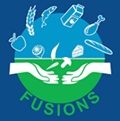
European food waste prevention project, FUSIONS, announces the launch of seven social innovation feasibility studies to help deliver action on the ground. FUSIONS (Food Use for Social Innovation by Optimising Waste Prevention Strategies) is working towards achieving a more resource efficient Europe by significantly reducing food waste. The project runs for 4 years, from August 2012 to July 2016, is funded by the European Commission framework programme 7 and coordinated by Wageningen UR Food & Biobased Research
Social innovation has huge potential to complement existing research, technological and communications activities, and using it to tackle food waste is a specific challenge set by the European Commission for FUSIONS. It brings people together to create solutions and take action. The feasibility studies are a great delivery tool which will deliver real-world findings that are easily diffused.
For the purpose of the pilots, social innovation is described as innovations that are social in both their ends and means[1]. As such, they simultaneously meet social needs and create new social relationships. The UK partner, WRAP is leading the work to identify, implement and evaluate the FUSIONS feasibility studies.
Thirty-nine proposals responded to the call for ideas between February and November 2013 (2). Seven will be delivered by FUSIONS’ Partners in countries around Europe. Over the coming months, these projects will be supported and evaluated so that FUSIONS can discover the potential of social innovation, and some of the key barriers and opportunities to its delivery.
FUSIONS feasibility studies (http://www.eu-fusions.org/social-innovations#social-innovation-category-5)
Order-Cook-Pay
Partner: The Swedish Institute for Food and Biotechnology, Sweden
The study tackles canteen food waste by transforming traditional ways of working within the food service sector. It will develop and implement a web-based tool to provide school kitchens and business canteens with accurate information about the numbers of lunches to serve.
Surplus Food
Partner: Stop Wasting Food, Communique, Denmark
The study tests a decentralised system to connect surplus food with those in need via the internet or an SMS service that connects local food producers, retailers, restaurants and catering outlets with local shelters, crisis and refugee centres, women shelters, etc.
The Gleaning Network EU
Partner: Feeding the 5000, UK
Gleaning Network EU aims to disseminate best practice guidance and support for the creation of national gleaning networks to redistribute wasted fruit and vegetables from farms to charities. The study will provide a model for collaboration between growers, grassroots volunteers and charities across Europe, as well as giving specific support to groups initiating gleaning networks.
Food Service and Hospitality Surplus Redistribution
Partner: The Hungarian Foodbank Association, Hungary, BIO by Deloitte, France
This Feasibility Study will develop new social relationships between the food service sector and food banks in Hungary, as well as providing a model for collaboration that can be replicated across Europe.
Disco BôCô
Partners: Feeding the 5000 (UK), Bio by Deloitte (France)
Disco BôCô aims to organise collaborative and festive events to bring people together to cook and preserve discarded fruits and vegetables. The project will mobilise local communities to connect and make use of food surplus by developing domestic preservation skills.
Advancing Social Supermarkets
Partners: University of Natural Resources and Life Sciences (Austria), Bio by Deloitte (France)
This Feasibility Study supports the implementation of “social supermarkets” in the EU based on the experiences of already established markets in France as well as in Austria.
Cr-EAT-ive Schools
Partners: Anatoliki (Development Agency Thessaloniki), Greece
The project aims to develop food waste prevention methods and practical tips to encourage behaviour change in the families of preschool children (aged 3-5 years) at home and in the food services of the crèches and kindergartens. This will be achieved through the development of a series of innovative educational tools and activities that will involve parents, children, preschool educators and cooks.





